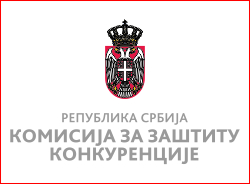 The Commission for Protection of Competition has prepared proposals for four regulations, which it intends to submit to the Government of the Republic of Serbia for adoption, pursuant to the authorities conferred by the Law on Protection of Competition. The proposed legislative acts include the following:
The Commission for Protection of Competition has prepared proposals for four regulations, which it intends to submit to the Government of the Republic of Serbia for adoption, pursuant to the authorities conferred by the Law on Protection of Competition. The proposed legislative acts include the following:
1. Regulation on categories of vertical agreements exempted from the prohibition of restrictive agreements;
2. Regulation on categories of technology transfer agreements exempted from the prohibition of restrictive agreements;
3. Regulation on categories of vertical agreements on repair and maintenance of motor vehicles and agreements on the sale of spare parts in the motor vehicle sector exempted from the prohibition of restrictive agreements; and
4. Regulation on categories of agreements in the railway and road transport sector exempted from the prohibition of restrictive agreements.
The texts of the proposed regulations have been published on the portal https://ekonsultacije.gov.rs/. The Commission invites all market participants, business associations, law firms, experts, and other interested parties to submit their comments, proposals, and suggestions by July 15, 2024, via the eKonsultacije portal.
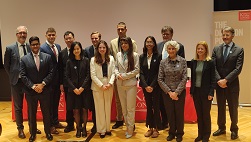 The Commission for Protection of Competition extends its heartfelt congratulations to the Dean and the team of the University of Belgrade Faculty of Law for their remarkable achievement in securing third place at the prestigious Herbert Smith Freehills Competition Law Moot, an international competition in EU competition law held recently in London.
The Commission for Protection of Competition extends its heartfelt congratulations to the Dean and the team of the University of Belgrade Faculty of Law for their remarkable achievement in securing third place at the prestigious Herbert Smith Freehills Competition Law Moot, an international competition in EU competition law held recently in London.
The competition was held for the tenth consecutive year at the King’s College London Faculty of Law – The Dickson Poon School of Law. In the written phase of the competition, 49 teams from distinguished universities across the globe participated, whereby this year marked the first occasion on which the University of Belgrade Faculty of Law had a representative in this esteemed event.
As a result of their success in the written phase of the competition and their qualification as one of the top 12 teams, the team from the University of Belgrade Faculty of Law, under the mentorship of Assistant Professor Dr. Nikola Ilić and Maja Dobrić from the Commission for Protection of Competition, participated in the oral rounds. Following the first day of the competition, the team was ranked first in their group, achieving a victory over the University of Amsterdam, last year’s runner-up. On the second day of the competition, the team concluded the semifinals with one point fewer than the University of Hong Kong, ultimately securing third place in the overall standings, while the University of Hong Kong was proclaimed the winner of the competition.
 The Commission for Protection of Competition of the Republic of Serbia took part in the 23rd Annual Conference of the International Competition Network (ICN), under the auspices of the ICN Secretariat. The conference was held in Sauipe, Brazil, and hosted by Brazil’s competition authority, the Administrative Council for Economic Defense (CADE).
The Commission for Protection of Competition of the Republic of Serbia took part in the 23rd Annual Conference of the International Competition Network (ICN), under the auspices of the ICN Secretariat. The conference was held in Sauipe, Brazil, and hosted by Brazil’s competition authority, the Administrative Council for Economic Defense (CADE).
During the conference, Ms. Nina Vasić, LL.M., Senior Advisor in the Department for Legal Affairs and Domestic and International Cooperation at the Commission, participated as a speaker in the panel of the ICN Agency Effectiveness Working Group (ICN AEWG). The panel addressed the topic of effective training and capacity development for competition authorities.
This year’s conference addressed some of the most relevant topics in competition protection, such as combating cartels in the face of socio-economic challenges and digitalization, and the interplay between global markets and local needs in agriculture and food supply. It also featured discussions on the activities of ICN working groups, covering key issues like the abuse of dominant market positions, anti-cartel enforcement, enhancing the effectiveness of competition authorities, and promoting competition advocacy to the public.
The conference brought together approximately 400 participants from 80 countries, including representatives from competition authorities, international organizations, university professors, lawyers, consultants specializing in competition law, and other experts in the field.
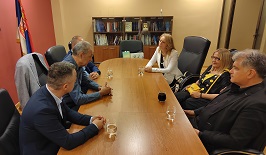 The delegation of the Commission for the Protection of Competition of North Macedonia, led by President Ana Nikoloska, visited the Commission for Protection of Competition and held discussions with Council members Čedomir Radojčić and Siniša Milošević.
The delegation of the Commission for the Protection of Competition of North Macedonia, led by President Ana Nikoloska, visited the Commission for Protection of Competition and held discussions with Council members Čedomir Radojčić and Siniša Milošević.
The discussions primarily focused on bilateral cooperation in the enforcement of competition protection policies and on exploring concrete avenues for enhancing collaboration, as defined by the Memorandum of Understanding and Cooperation in the area of competition policy and law, signed in 2016.
The discussions also encompassed the exchange of experiences between the two institutions in the context of Serbia’s and North Macedonia’s EU accession processes, as well as the continued enhancement of regional cooperation among competition authorities.
The meeting was also attended by Rozana Vankovska, member of the North Macedonian Commission, Jovan Todorov, Head of the State Aid Department of North Macedonia’s CPC, and Mile Uzunovski, Head of the Sector within the Commission for Protection of Competition.
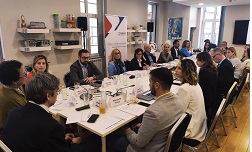 The Commission for Protection of Competition and public prosecutors’ offices held a joint workshop to exchange experiences regarding public procurement procedures in which violations of competition, as stipulated in Article 10 of the Law on Protection of Competition, were identified. This workshop was organized by the Judicial Academy as part of the USAID project aimed at improving public procurement.
The Commission for Protection of Competition and public prosecutors’ offices held a joint workshop to exchange experiences regarding public procurement procedures in which violations of competition, as stipulated in Article 10 of the Law on Protection of Competition, were identified. This workshop was organized by the Judicial Academy as part of the USAID project aimed at improving public procurement.
The workshop presented and analyzed measures for the protection of competition and the leniency program under the Law on Protection of Competition. It also addressed restrictive agreements and the specifics of administrative procedures related to public procurement, where violations of competition as outlined in Article 10 of the Law on Protection of Competition were identified. Additionally, it covered prosecutorial practices concerning the conditions for criminal prosecution of offenses related to abuse in connection with public procurement under Article 228, paragraph 1, and the conclusion of restrictive agreements under Article 229, paragraph 1, of the Criminal Code and the conditions for optional exemption from penalties as stipulated in Article 229, paragraph 2, of the Criminal Code.
Following discussions at the workshop, conclusions and recommendations were adopted to define the scope and possibilities for collaboration between the Commission for Protection of Competition and the Public Prosecutor’s Office.
The workshop was attended by public prosecutors from Belgrade, Niš, Novi Sad, and Kraljevo, as well as representatives from the Commission for Protection of Competition.
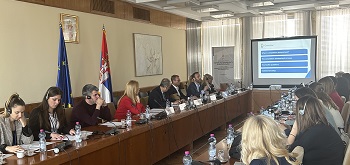 The Commission for Protection of Competition, in partnership with the OECD Competition Division and the OECD Southeast Europe Division, as well as the Republic Secretariat for Public Policies, conducted a seminar focused on assessing the impact of regulations on market competition.
The Commission for Protection of Competition, in partnership with the OECD Competition Division and the OECD Southeast Europe Division, as well as the Republic Secretariat for Public Policies, conducted a seminar focused on assessing the impact of regulations on market competition.
The seminar featured addresses from Čedomir Radojčić, a member of the Council of the Commission for Protection of Competition; Sanja Mešanović, Deputy Director of the Republic Secretariat for Public Policies; and Gordana Lukić, Head of the Sector for Legal Affairs, Domestic and International Cooperation at the Commission for Protection of Competition.
The seminar was attended by civil servants involved in drafting regulations at ministries and other organizations exercising public authority. The seminar was also supported through the OECD project “Fair Market Conditions for Competitiveness” (https://www.oecd.org/south-east-europe/programme/fair-market-conditions-adriatic.htm).
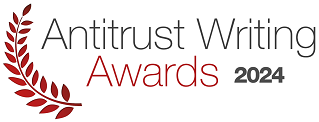 The Commission’s guidelines for drafting compliance programs, with the accompanying model and compliance checklists, won this year’s Antitrust Writing Awards readers vote award in the section of the best “Soft Law” materials of competition authorities (Soft Laws & Studies – Best ” soft laws” and studies) in the region of Europe. The full name of the award is “Best Soft Law, Europe, Readers Choice – 2024 Antitrust Writing Awards”.
The Commission’s guidelines for drafting compliance programs, with the accompanying model and compliance checklists, won this year’s Antitrust Writing Awards readers vote award in the section of the best “Soft Law” materials of competition authorities (Soft Laws & Studies – Best ” soft laws” and studies) in the region of Europe. The full name of the award is “Best Soft Law, Europe, Readers Choice – 2024 Antitrust Writing Awards”.
These prestigious awards are organized by the publication Concurrences and George Washington University, and the goal is to promote the study of competition law and contribute to the promotion and advocacy of competition protection (antitrust advocacy) in the spheres of law and economics.
The Commission’s publication is one of the eight awarded “Soft Law” materials of competition authorities, and in addition to the Commission’s guidelines, the works of the European Commission and the competition protection bodies of the United Kingdom, France, Austria, Hungary, Portugal, Spain, the Netherlands, Lithuania and Turkey, were eligible for votes in the category “Europe”.
The selection of the Best “soft laws” and studies aims to contribute to the development of the culture and awareness of competition protection. This category seeks to support the international promotion and advocacy of competition protection (antitrust advocacy) by highlighting the most expedient and relevant materials of competition protection bodies that do not refer to specific subjects and procedures, such as guidelines, market analyses, etc. It aims to single out some of the most interesting administrative practices that could be applied more often and more widely.
 The Commission, based on publicly available data, has been notified on the intent of all three mobile operators to increase the prices of their services. However, based on this fact alone it cannot be concluded it is a behavior that is potentially contrary to the Law on Protection of Competition.
The Commission, based on publicly available data, has been notified on the intent of all three mobile operators to increase the prices of their services. However, based on this fact alone it cannot be concluded it is a behavior that is potentially contrary to the Law on Protection of Competition.
As in all other cases, in this specific case, in order for the Commission to determine it is a prohibited behavior, legal procedure must be implemented beforehand to determine the existence of antitrust infringements. The purpose of procedure implementation is to collect facts that could prove the violation of the Law on Protection of Competition.
However, considering there is a formal, legally prescribed standard for initiation of procedure in front of the Commission, which is the well-founded presumption antitrust infringement has occurred, it is necessary to determine the merits of statements and review the facts beforehand. In case it is subsequently concluded there is a reasonable doubt that detected behavior is the result of illegal action, the Commission shall initiate the procedure of reviewing antitrust infringement.
Since, in line with the Law on Protection of Competition, the Commission has different mechanisms available to collect the necessary facts, the Commission shall not announce its possible intention to act in specific cases.
 The Commission for the Protection of Competition and the National Competition Commission of Paraguay (CONACOM – Comisión Nacional de la Competencia) held a joint online session where representatives of the Commission presented the working method related to the independent detection of cartels without relying on the leniency program,notifications or cooperation with other authorities.
The Commission for the Protection of Competition and the National Competition Commission of Paraguay (CONACOM – Comisión Nacional de la Competencia) held a joint online session where representatives of the Commission presented the working method related to the independent detection of cartels without relying on the leniency program,notifications or cooperation with other authorities.
Officials and representatives of the Paraguayan authorities were explained the cartel detection method developed by the Commission and were familiarized with its practice regarding the detection and proof of concerted practices as a type of restrictive agreement.
The collaboration took place during the 22nd annual conference “Global Competition Forum” Organization for Economic Cooperation and Development (OECD) held in Paris, where CONACOM officials expressed interest in the method presented by the Commission for the Protection of Competition.
A member of the Council of the National Competition Commission of Paraguay, Eduardo Barros, expressed his gratitude to the Commission for the presentation held to CONACOM employees.
 Commission for Protection of Competition determined that companies KTG Solucije and Eco Sense Subotica with seat in Subotica agreed on the terms of participating in several public procurements procedures that were related to the procurement of cleaning products, thus concluding a restrictive agreement.
Commission for Protection of Competition determined that companies KTG Solucije and Eco Sense Subotica with seat in Subotica agreed on the terms of participating in several public procurements procedures that were related to the procurement of cleaning products, thus concluding a restrictive agreement.
The Commission, through the Public Procurement Office, learned that KTG Solucije, as the bidder in certain public procurement procedures withdrew from the bids, thereby the contracting parties concluded the agreements with second-ranked bidder, Eco Sense, but, with higher prices compared to the ones offered by KTG Solucije. The subject of disputable public disputes were materials and products for cleaning buildings.
In addition to information on withdrawal from bids, the Commission, through the analysis of IP addresses (Internet Protocol Address) from which KTG Solucije d.o.o. and Eco Sense d.o.o. accessed the Public Procurement Portal in the said public procurement procedures, whether to download tender documents or submit bids, concluded that both companies almost always accessed from identical IP addresses. Results of IP address analysis point to the fact that both companies accessed the Public Procurement Portal almost always from devices that were connected on the same internet network, possibly from the same device.
Protection competition measures were imposed to the participants in a restrictive agreement, which was reduced for KTG Solucije due to the fact it used the “leniency program”, in line with Article 69 of the Law. The significance of this case is that this is the first case in which the Commission determined fulfilment of conditions to reduce the obligation of monetary amount payment related to competition protection measure based on the notification of the participant in restrictive agreement submitted during the procedure, that is, after it has been initiated.
 The Commission for Protection of Competition has prepared proposals for four regulations, which it intends to submit to the Government of the Republic of Serbia for adoption, pursuant to the authorities conferred by the Law on Protection of Competition. The proposed legislative acts include the following:
The Commission for Protection of Competition has prepared proposals for four regulations, which it intends to submit to the Government of the Republic of Serbia for adoption, pursuant to the authorities conferred by the Law on Protection of Competition. The proposed legislative acts include the following: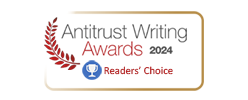


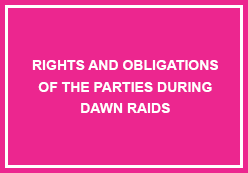
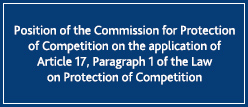
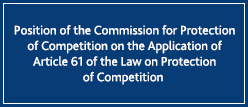
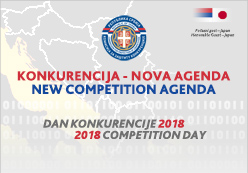
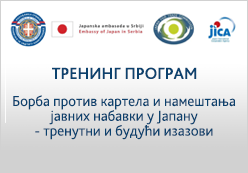
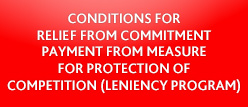

 The Commission for Protection of Competition extends its heartfelt congratulations to the Dean and the team of the University of Belgrade Faculty of Law for their remarkable achievement in securing third place at the prestigious Herbert Smith Freehills Competition Law Moot, an international competition in EU competition law held recently in London.
The Commission for Protection of Competition extends its heartfelt congratulations to the Dean and the team of the University of Belgrade Faculty of Law for their remarkable achievement in securing third place at the prestigious Herbert Smith Freehills Competition Law Moot, an international competition in EU competition law held recently in London.  The Commission for Protection of Competition of the Republic of Serbia took part in the 23rd Annual Conference of the International Competition Network (ICN), under the auspices of the ICN Secretariat. The conference was held in Sauipe, Brazil, and hosted by Brazil’s competition authority, the Administrative Council for Economic Defense (CADE).
The Commission for Protection of Competition of the Republic of Serbia took part in the 23rd Annual Conference of the International Competition Network (ICN), under the auspices of the ICN Secretariat. The conference was held in Sauipe, Brazil, and hosted by Brazil’s competition authority, the Administrative Council for Economic Defense (CADE). The delegation of the Commission for the Protection of Competition of North Macedonia, led by President Ana Nikoloska, visited the Commission for Protection of Competition and held discussions with Council members Čedomir Radojčić and Siniša Milošević.
The delegation of the Commission for the Protection of Competition of North Macedonia, led by President Ana Nikoloska, visited the Commission for Protection of Competition and held discussions with Council members Čedomir Radojčić and Siniša Milošević. The Commission for Protection of Competition and public prosecutors’ offices held a joint workshop to exchange experiences regarding public procurement procedures in which violations of competition, as stipulated in Article 10 of the Law on Protection of Competition, were identified. This workshop was organized by the Judicial Academy as part of the USAID project aimed at improving public procurement.
The Commission for Protection of Competition and public prosecutors’ offices held a joint workshop to exchange experiences regarding public procurement procedures in which violations of competition, as stipulated in Article 10 of the Law on Protection of Competition, were identified. This workshop was organized by the Judicial Academy as part of the USAID project aimed at improving public procurement. The Commission for Protection of Competition, in partnership with the OECD Competition Division and the OECD Southeast Europe Division, as well as the Republic Secretariat for Public Policies, conducted a seminar focused on assessing the impact of regulations on market competition.
The Commission for Protection of Competition, in partnership with the OECD Competition Division and the OECD Southeast Europe Division, as well as the Republic Secretariat for Public Policies, conducted a seminar focused on assessing the impact of regulations on market competition. The Commission’s guidelines for drafting compliance programs, with the accompanying model and compliance checklists, won this year’s
The Commission’s guidelines for drafting compliance programs, with the accompanying model and compliance checklists, won this year’s  The Commission for the Protection of Competition and the National Competition Commission of Paraguay (CONACOM – Comisión Nacional de la Competencia) held a joint online session where representatives of the Commission presented the working method related to the independent detection of cartels without relying on the leniency program,notifications or cooperation with other authorities.
The Commission for the Protection of Competition and the National Competition Commission of Paraguay (CONACOM – Comisión Nacional de la Competencia) held a joint online session where representatives of the Commission presented the working method related to the independent detection of cartels without relying on the leniency program,notifications or cooperation with other authorities.